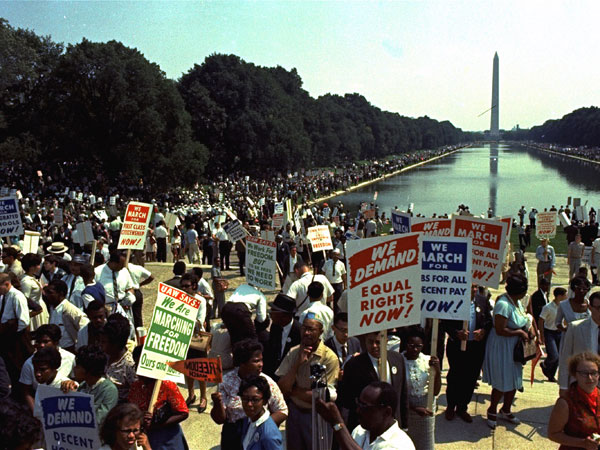Between the MLK holiday and the president’s Friday speech on NSA spying, two little words have flowed from our lips lately without much thought: civil rights.
Videos by Rare
For a moment of unpatronizing clarity, let’s revisit the definition of “civil rights”: individual rights protected from infringement by governments and private entities.
When a person’s civil rights are violated, it is a violation of us all. This is because the thought-pattern used to justify the violation of our civil rights can apply to virtually any issue; change out the players plugged into the equation and you always get the same answer, which is violation.
It is for this reason that it is so important to put political parties aside and unite behind the common interest in protecting civil rights.
But the issue isn’t always cut and dry. For example, when interests such as law enforcement or national security are in play, profiling has become a questionable violation of our civil rights.
Is it OK for the government to enforce laws simply based on group identification? While some would argue that groups tend to have common behaviors and therefore law enforcement can better identify and mitigate nefarious behaviors by profiling, others believe that targeting is a violation of our rights.
Last week, the Justice Department announced that it will “significantly expand its definition of racial profiling to prohibit federal agents from considering religion, national origin, gender and sexual orientation in their investigations.” This change came in particular response to Muslims and Latinos being singled out by law enforcement.
Mind you, none of these changes include cases of national security. In the name of “national security,” the limits of government power seem virtually endless.
But if you have to choose, which will you take: Profiling with security or civil liberties with less security?
—
Whether purposeful or not, the term “civil rights” has been hijacked in recent decades to become synonymous with the horrendous, institutionalized discrimination of black Americans. While the systematic violation of their civil rights is egregious, it isn’t exclusive to one race. For example, the Voting Rights Act of 1965 protects every American against racial discrimination in voting, not just blacks.
You would therefore think that the Civil Rights Division within the Department of Justice would work on behalf of all Americans, but that’s not necessarily the case.
Read the Inspector General’s report on the Voting Rights Section of the Civil Rights Division, released in March 2013, to get a glimpse of what I’m talking about:
On July 6, 2010, a former trial attorney in the Department’s Voting Section who had worked on the NBPP case testified at a USCCR hearing concerning the case and the Voting Section’s enforcement of voting laws. In that appearance, the attorney stated that he perceived that there was an “open hostility [in the Division] toward equal enforcement in a colorblind way of the voting rights laws.” In addition, the attorney testified that he was told that CRT leadership had instructed Voting Section management that the Voting Section would not pursue cases against Black defendants for the benefit of White victims, and that CRT leadership told the Voting Section that the new administration had “no interest in enforcing” a statutory provision regarding the removal of ineligible voters from voter rolls because those provisions purportedly are more strongly supported by Republicans and remove more potential Democratic voters from the voting rolls.
The politicization within the division is pervasive and should call into question the authority of the executive branch to faithfully execute the laws.
It hits at the root outrage over the Justice Department’s decision not to pursue the case of the Black Panthers intimidating voters outside a polling station in 2008.
The recent decision of the Justice Department to send a lawyer from the Civil Rights Division to investigate the IRS targeting of tea party conservatives adds fuel to the outrage. Beyond the fact that the lawyer is a Democrat donor, the fact that a civil rights lawyer was sent to investigate a tax matter is curious. The fact that she decided there was no criminal activity worth pursuing makes it all the worse.
A violation is a violation is a violation, no matter the race, or religion, or the players involved.
—
The Justice Department is currently teaming up with the new Consumer Financial Protection Bureau. These two government entities are targeting car lenders over their allegedly racist, disparate lending practices.
Ally Bank recently settled with the DOJ and the CFPB for almost $100 million for “[charging] African-American borrowers more than white borrowers in interest-rate markups not based on creditworthiness or other objective criteria related to borrower risk.” Sound familiar?
This new alliance of advocates on behalf of “consumer protection” and “civil rights” have pilfered over $800 million from the financial industry on the grounds of disparate impact. At least in the case of Ally Bank, there are three issues: The data used to prove disparate impact is questionably vague, it only focuses on black vs. white and doesn’t compare other potential disparities, it focuses on skin color rather than behavior.
That leads back us back to the beginning – Is it possible to separate outside traits such as skin color from behaviors? After all, a business such as Ally Bank should have every right to weigh the risks involved with taking on a new creditor. They wouldn’t be in business long if they didn’t.
—
We, as individuals, are responsible for our own behavior. We should expect our civil liberties, no matter what groups we belong to, be equally and justly protected. Government targeting in the name of “civil rights” does nothing to solve real problems or protect our liberties.



